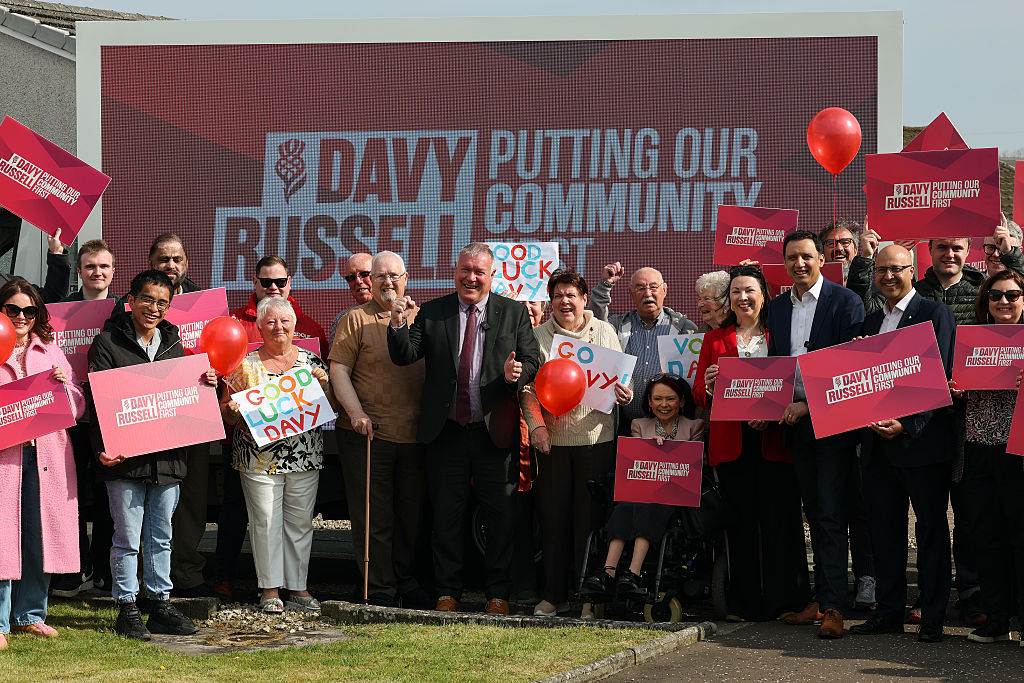Nigel Farage will make his first political visit north of the border in six years this week, causing intense excitement in the Scottish media. The Reform UK leader’s trips here rarely pass without incident, including the time he sought refuge from protesters in an Edinburgh pub or when a nearby branch of McDonald’s was asked by police not to sell milkshakes. Activists are already targeting the visit to Hamilton. Which is, of course, precisely what the media-hungry Farage wants.
To date, media coverage of the Scottish parliamentary by-election campaign in Hamilton, Larkhall and Stonehouse in the heart of the central belt has breathlessly predicted a Reform breakthrough, which could push Scottish Labour into third place according to several commentators. First Minister John Swinney has railed against Farage, holding a cross-party summit that inevitably provided even more free publicity for the Clacton MP.
If Labour fails to win this by-election, it will be as much to do with Farage bailing out Swinney as it is with Keir Starmer’s teething problems in government.
And yet, as diametrically opposed as the SNP and Reform are, the latter’s rise has come at precisely the right moment for Swinney. Even with his party way down in the polls compared to 2021, and clear voter dissatisfaction after nearly two decades in power, the polls suggest he is still on course for victory as the anti-SNP coalition splinters. If Labour fails to win a by-election that it would have walked this time last year, it will be as much to do with Farage bailing out Swinney as it is with Keir Starmer’s teething problems in government.
But in Hamilton, Larkhall and Stonehouse, campaign teams insist the contest remains close. With much of the media gaze seen through a national prism, Scottish Labour is running a traditional local ground operation away from the spotlight. Seasoned activists armed with extensive data are going door-to-door, trying to squeeze every voter they can before polling day on 5 June and rebuild the anti-SNP coalition that returned 37 Labour MPs last year.
In the 2023 Westminster by-election in neighbouring Rutherglen, these conversations were quick. Today, they are far longer. There is anger towards Keir Starmer’s Labour government; that promise of ‘change’ hasn’t materialised, they argue. But dissatisfaction, too, with the SNP’s long record in office and the state of public services. Persuading people not to resort to a protest vote against both parties is Labour’s primary mission.
The result may hinge on how many of these conversations can take place before polling day. Reform campaigners will have far fewer meaningful chats with voters. The insurgent party simply doesn’t have the voter ID to know where the undecideds live, or which houses are a waste of time, so it largely relies on creating a media narrative and deploying gutter online tactics. This includes an advert which targets Scottish Labour leader Anas Sarwar, questioning his belonging to Scotland, which Farage has doubled down on.
Away from this air war, however, Labour strategists remain positive. Their decision to focus so much on the ground campaign has partially led to a contentious decision to reject STV’s plans for a national TV debate – with candidate Davy Russell insisting he would ‘rather be chapping doors and talking and listening to ordinary voters’. Critical commentators pointed out that the debate won’t take place until after 10.30 p.m. although this fails to acknowledge the huge amount of preparation these shows require. (Who on earth is clamouring for a national TV debate between the candidates anyway?)
That doesn’t tell the full story though. Russell is not a polished media performer and is unlikely to relish a TV debate. He has avoided any one-to-one interviews with journalists, and his awkward social media clips appear to have been edited. But he is well-known and liked locally – not least in the pubs where he sings Frank Sinatra classics or the bowling clubs where he competes on the lawns.
The unwaveringly loyal pro-SNP newspaper the National ran a sneering story with the headline ‘Scottish Labour MSP candidate “can’t string a sentence together”‘ – with the quote attributed to an SNP councillor. There is a whiff of snobbery in some of the commentary. As one MP who came from England to campaign pointed out: ‘Davy speaks like everyone else round here.’
The SNP’s candidate, Katy Loudon, is the more traditional by-election candidate. Comfortable in front of the media, articulate, doesn’t live in the constituency, and desperate to be elected (this is her third time as a parliamentary candidate in less than two years). The media narrative is that she will win on 5 June, prompting some within the SNP to worry about complacency.
Feedback from the SNP campaign acknowledges there is an angry electorate, and Reform – which straddles the yes/no constitutional divide in Scotland more than is often acknowledged – is peeling off voters from all sides. But sources claim that voters are, for now anyway, angrier with Keir Starmer than they are with John Swinney. Coupled with the increasing popularity of Nigel Farage, Swinney probably can’t quite believe his good fortune.







Comments